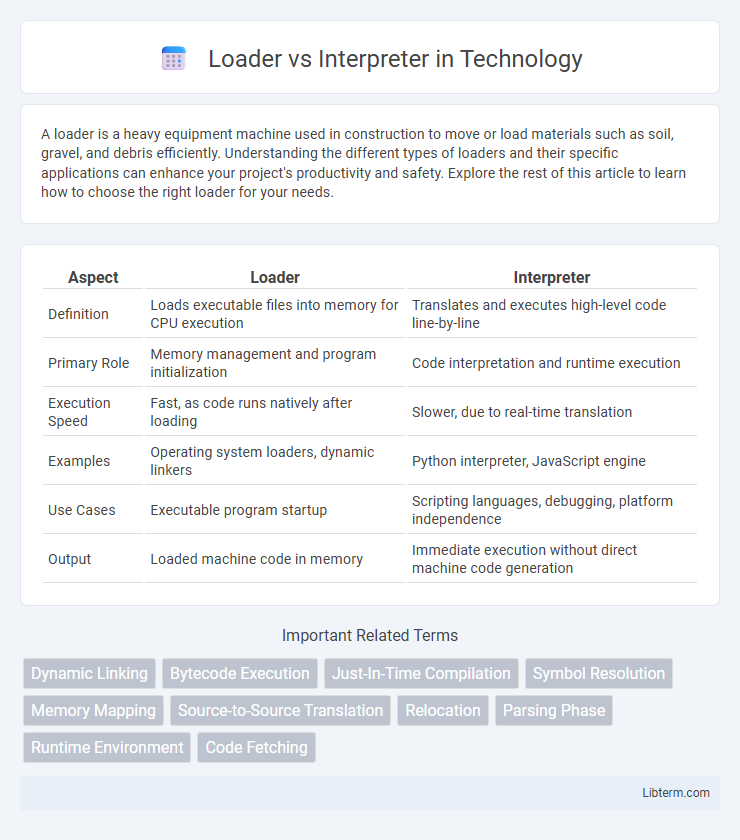A loader is a heavy equipment machine used in construction to move or load materials such as soil, gravel, and debris efficiently. Understanding the different types of loaders and their specific applications can enhance your project's productivity and safety. Explore the rest of this article to learn how to choose the right loader for your needs.
Table of Comparison
| Aspect | Loader | Interpreter |
|---|---|---|
| Definition | Loads executable files into memory for CPU execution | Translates and executes high-level code line-by-line |
| Primary Role | Memory management and program initialization | Code interpretation and runtime execution |
| Execution Speed | Fast, as code runs natively after loading | Slower, due to real-time translation |
| Examples | Operating system loaders, dynamic linkers | Python interpreter, JavaScript engine |
| Use Cases | Executable program startup | Scripting languages, debugging, platform independence |
| Output | Loaded machine code in memory | Immediate execution without direct machine code generation |
Introduction to Loaders and Interpreters
Loaders are system software responsible for loading executable files into memory for program execution, handling address relocation, and preparing the program's runtime environment. Interpreters directly execute high-level programming code line-by-line without producing an intermediate machine code file, enabling dynamic code execution and easier debugging. Understanding the fundamental roles of loaders in memory management and interpreters in code execution is essential for optimizing software performance and development workflows.
What is a Loader?
A loader is a system software component responsible for loading executable files into memory, preparing them for execution by resolving symbolic references and allocating necessary resources. It plays a critical role in memory management by mapping program segments to physical or virtual addresses, ensuring efficient access during runtime. The loader also initializes program execution environments by setting up stack, heap, and registers before transferring control to the program's entry point.
What is an Interpreter?
An interpreter is a program that executes code line-by-line, translating high-level programming languages directly into machine code during runtime. Unlike loaders, which primarily handle loading compiled code into memory for execution, interpreters dynamically analyze and process source code without producing an intermediate executable file. This approach allows for immediate code testing and debugging but generally results in slower execution compared to pre-compiled programs.
Core Differences Between Loader and Interpreter
The core difference between a loader and an interpreter lies in their primary functions within program execution: a loader is responsible for loading executable files into memory, resolving addresses, and preparing the program for execution, whereas an interpreter translates high-level programming code into machine code line-by-line at runtime. Loaders operate once during the program's initial startup phase, managing memory allocation and setting execution entry points, while interpreters continuously convert and execute source code dynamically, resulting in slower execution speed compared to preloaded binaries. Loaders work closely with the operating system to manage program segments and symbol tables, whereas interpreters focus on runtime parsing, syntax analysis, and immediate execution without creating separate machine code files.
Working Mechanism of a Loader
A loader is responsible for loading executable files into memory, resolving symbolic references, and preparing the program for execution by setting up address space and linking necessary libraries. It allocates memory blocks, performs relocation by adjusting address-dependent code, and initializes the program's runtime environment. Unlike an interpreter that executes code line-by-line, a loader handles the pre-runtime process, enabling the operating system to run compiled binaries efficiently.
Working Mechanism of an Interpreter
An interpreter processes source code by translating each high-level statement into machine-executable instructions one at a time during runtime, enabling immediate execution and easier debugging. It reads the program line-by-line, converts it into an intermediate representation or directly into machine code, and executes it on the fly without producing an independent executable file. This step-by-step execution contrasts with a loader, which primarily loads machine code from executable files into memory for execution by the operating system.
Advantages of Using Loaders
Loaders enhance program execution speed by directly placing executable files into memory, bypassing the need for real-time code translation as interpreters do. They improve runtime efficiency and reduce CPU overhead since the code is already in machine-readable format upon loading. Using loaders also supports dynamic linking and relocation, enabling modular program design and faster application startup times.
Benefits of Using Interpreters
Interpreters provide real-time code execution, enabling immediate testing and debugging, which accelerates development cycles. They support dynamic typing and flexible syntax, allowing programmers to write and modify code with ease during runtime. Interpreters enhance platform independence by executing code line-by-line, eliminating the need for separate compilation and enabling seamless cross-platform compatibility.
Loader vs Interpreter: Use Case Scenarios
Loaders are essential in operating systems for loading executable files into memory, preparing them for execution by resolving addresses and allocating necessary resources. Interpreters translate and execute code line-by-line, making them ideal for scripting languages, debugging, and scenarios requiring immediate code execution without prior compilation. Use case scenarios for loaders include system-level application loading and OS boot processes, whereas interpreters excel in dynamic environments like interactive coding sessions, rapid prototyping, and educational tools.
Conclusion: Choosing Between Loader and Interpreter
Choosing between a loader and an interpreter depends on the specific use case and performance requirements of the software application. Loaders excel in quickly loading and linking executable files into memory for faster execution, while interpreters provide flexibility by executing code line-by-line, facilitating easy debugging and platform independence. Developers often prefer loaders for compiled languages requiring efficient runtime performance, whereas interpreters are favored in dynamic environments and during development for their adaptability and simplified error tracking.
Loader Infographic

 libterm.com
libterm.com